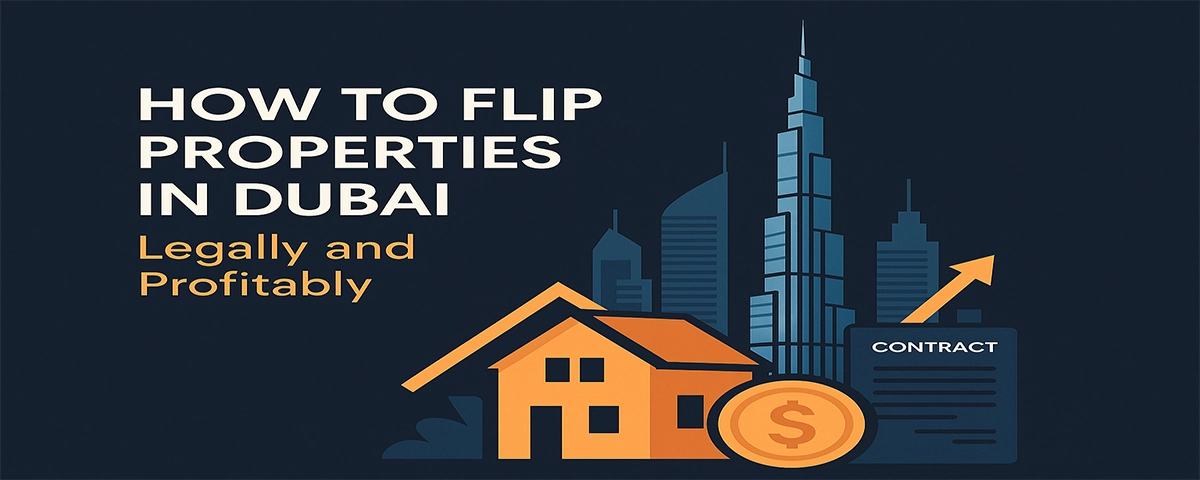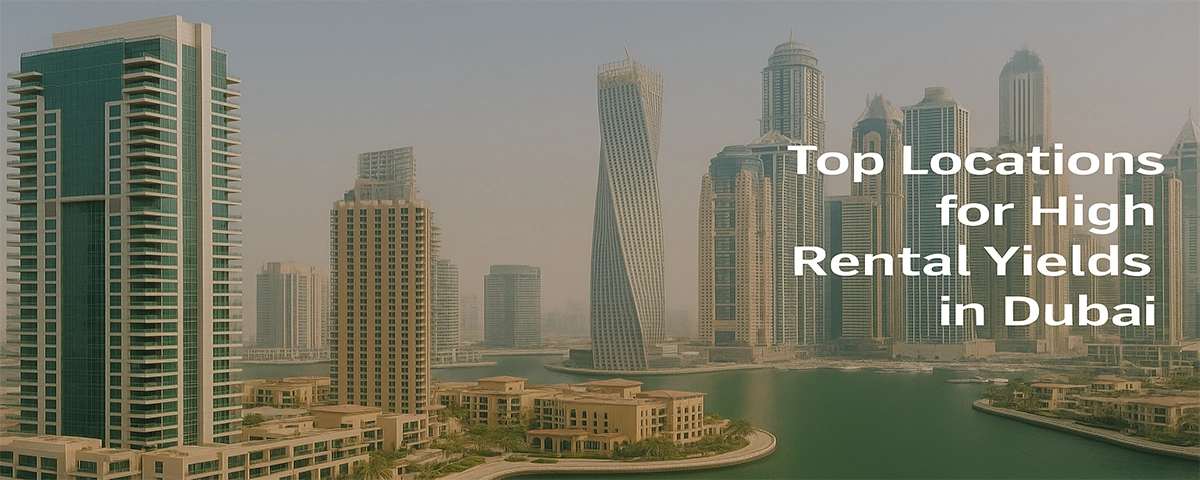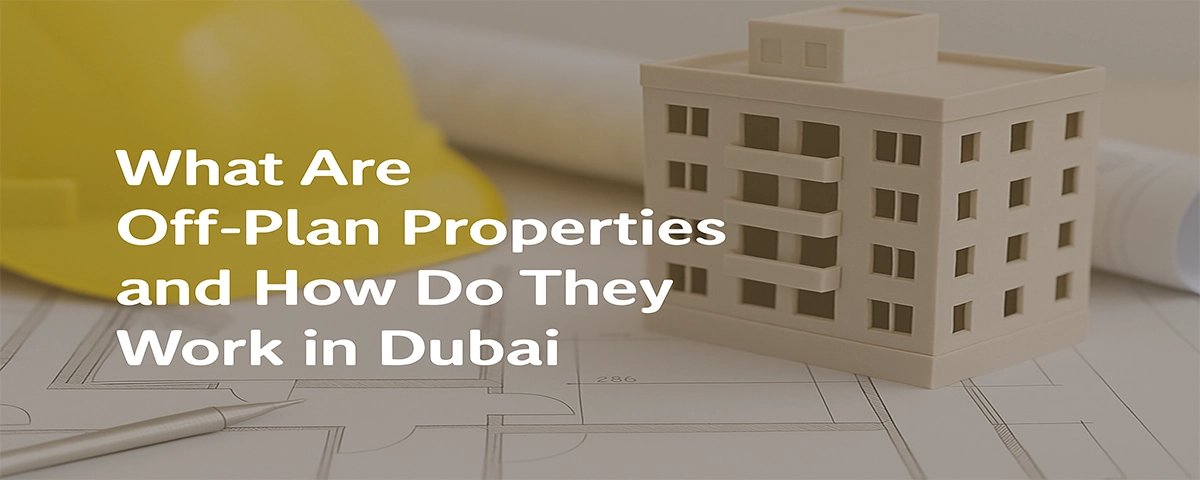The current property flipping has been among the most talked investment strategies in the booming Dubai real estate property market. Dubai is famous as a place of fast-paced development, favorable conditions to investors, and strategic location, which makes the city a hub of property investors aiming at high returns within comparatively short time frames.
Nevertheless, property flipping in Dubai is not a matter of chance; it takes years of experience in understanding the market forces and strict adherence to legal frameworks, and disciplined financial planning.
This comprehensive guide will walk you through on how to flip properties in Dubai legally and profitably, with the latest market data and regulatory updates, ensuring you make informed and lucrative decisions.
Reasons Why Dubai Is a Viable Property Flipping Market:
Dubai offers a unique combination of factors that make it an attractive destination for property flippers:
1) Good Performance in the Market:
The real estate market of Dubai has been very resilient and prosperous. Betterhomes states that in the first quarter of 2025, there was an increment in off-plan sales by 35 percent and ready property transactions increased by 19 percent compared to the prior year.
Moreover, residential prices in Dubai have also increased by 16.2 percent within the last year, and it is estimated that the prices will further hike by up to 10 percent in 2025 making it the best-performing luxury property market in the world.
2) Good Rental Returns:
Dubai investors enjoy high rental yields in the world. It is reported that average gross rental yields are between 7.5 and 8 percent on apartments, much higher than in most other large cities.
3) Zero Capital Gains Tax:
Tax-free environment is one of the largest strengths of Dubai. There is no capital gains tax or income tax paid by the investors when selling the property and this translates into more of the profit remaining in your pocket. The main cost involved is the 4% DLD transfer fee – significantly lower than many global markets.
4) Investor Friendly Regulations:
The real estate sector in Dubai is regulated by well-established laws in the Dubai Land Department (DLD) and the Real Estate Regulatory Agency (RERA). Flippers are given legal security and transparency by the regulations like escrow account protections, requirements of NOCs when reselling off-plan and open title registration.
5) Growing Expat and Tourism Population:
The population of Dubai is likely to go up in a steady manner because of its position as an international business centre, tourist destination and safe-haven market. Increased inflows of population boost the demand of houses, which boosts the flipping and rental opportunities.
6) Convenient Financing to Investors:
Most of the banks in Dubai provide competitive mortgage products to suit the needs of investors and this includes financing off plan properties in Dubai. Developers also offer post handover payment schemes, which makes buyers who intend to flip have lesser need of upfront capital.
7) Lifestyle and World-Class Infrastructure:
Dubai has been rated as one of the best cities to live in the world, with high-quality infrastructure, modern facilities, and transport networks in the world. Properties in such settings automatically command high prices when reselling them.
8) Liquidity compared to Regional Markets:
Dubai has high liquidity as compared to other emerging property markets especially in the well-developed neighborhoods. Investors are usually able to sell properties more quickly, minimising holding costs and redeploying capital more quickly.
Legal Perspectives of Property Flipping in Dubai:
When venturing into flipping properties it is important to know the legalities involved:
1) Assignments of off-plan property:
Among the most popular flipping techniques in Dubai is the purchase of off-plan property and reselling it before the completion. Developers however, usually put some conditions that you must meet before you can resell on them and these conditions may include:
- A certain amount of the amount paid as purchase price (it is usually 30-50 percent)
- The issue of a No Objection Certificate (NOC) by the developer
Make sure that the project is registered in RERA and make sure that the assignment sales are permitted prior to signing any contracts.
2) Title deed and Transfer of ownership:
In case of completed properties, a formal transfer of title must be done at the DLD. The DLD requires all the parties to be present and all the service charges, outstanding dues, and taxes should be cleared prior to the transfer.
3) Taxation:
Dubai does not levy personal income tax or capital gain tax on property sales, which makes it favorable to flippers. But there are costs of transactions:
- 4 percent transfer fee (normally divided between buyer and seller)
- Admin fees AED 2,000-AED 4,000
Transparency and adherence to these laws is important to evade punishment and legal problems.
A Profitable Approach to Property Flipping in Dubai:
1) Market Research and Area Selection:
Begin by looking at high demand, high growth neighborhoods. In the current market, such regions as Dubai South, Jumeirah Village Circle (JVC), and Arabian Ranches are demonstrating stable growth with the expected growth rates of 5-8 percent by 2025.
Look for projects with strong developer reputations and attractive payment plans.
2) Risk management and Financial Planning:
A proper financial planning is the key to successful flipping. In addition to the purchase cost, allowance should be made:
- Registration charges
- Law and brokerage costs
- Mortgage expenses (in case of a mortgage)
- Renovation or staging expense
- Selling and marketing costs
The latest figures indicate that timely flips particularly on the off-plan projects can be profitable with a short-term investment of 25-35 percent.
Market cycles however have an impact on profitability. The Fitch Ratings have predicted that a high supply of new units will cause the market correction of 10-15 percent in Dubai later in 2025. Always do a stress test on your investment by modeling the scenarios where the property prices fall at least by 10%.
3) Value Addition and Renovation:
In the case of ready properties, minor modifications can enhance a high resale value. Focus on:
- Contemporary interior surfaces
- Home automation renovations
- Energy saving fixtures
- Professional staging for listings
Such improvements not only raise the selling price but also reduce the time on the market.
4) Exit Strategy and Marketing:
Before you purchase, define your exit strategy:
- In off-plan flips, time the resale when the market is high or when the project is nearing completion.
- With ready properties, list when there is the most demand and employ professional marketing sources, such as special expert real estate brokers in Dubai and online services.
Risks to Watch Out For:
Although flipping can be very lucrative, it does not come without risks:
- Oversupply: Be careful with the supply data; too many similar properties in your area will decrease profits.
- Delays: There may be construction delays or regulatory delays that delay your selling schedule.
- Financing Risks: Any alteration in mortgage regulations or interest rates may affect the demand of buyers.
- Market volatility: Due to the external forces such as oil prices, geopolitical tensions, or currency fluctuations, the property market of Dubai can be affected.
The trick is to make every deal under conservative financial model and have a contingency plan.
Final Thoughts:
Property flipping in Dubai can actually be lawful, very lucrative and repeatable, and this is only possible when one is doing it right. It requires an intensive market research, legality, intensive financial planning and well-coordinated exits.
Dubai offers high rental yields and increasing property prices as well as an open regulatory framework making it one of the most appealing destinations in the world to property investors.
By staying informed, working with licensed professionals such as at Roots Heritage Realty, and planning each deal meticulously, you can navigate the market confidently and unlock exceptional returns – while minimizing risks.
FAQs:
1) Is flipping property in Dubai legal?
Yes, it is completely legal to flip property in Dubai, as long as it complies with all the regulating conditions. In the case of off-plan properties, you are usually required to pay a specified amount of the property (usually 30 to 50 percent) and get a No Objection Certificate (NOC) of the developer before reselling. Every transaction should be registered in Dubai Land Department (DLD).
2) What are the profits involved in flipping property in Dubai?
The profit margins are different according to the market, geographical location and time. Recent statistics indicate that there is a potential to earn a 25 to 35 percent returns on off-plan property flips in 12 to 24 months in Dubai. The profits however are dependent on demand, supply and legal fees.
3) What is the minimum time to hold a property then flip it in Dubai?
Dubai does not have any prescribed holding period to conduct property flipping. Developers will however commonly limit assignment sales (off-plan resales) until a specified payment level – often 30% to 50% – is reached. In case of ready properties, resale may occur as soon as the ownership is transferred.
4) Does flipping of property attract any taxes in Dubai?
Dubai does not levy capital gains tax or income tax on sale of property. Nevertheless, you are supposed to pay a DLD transfer fee of 4 percent of the value of the transaction and other administrative fees. You should consider including these expenses into your budgeting.
5) Which are the best property flipping areas in Dubai in 2025?
The possible high-potential flipping areas in 2025 are:
- Dubai South
- Jumeirah Village Circle (JVC)
- Dubai Marina
- Arabian Ranches
These areas are experiencing high demand, high level of rental returns and massive off plan construction.
6) What are the main risks of flipping property in Dubai?
Important risks are:
- Market adjustments (potential 10-15 percent in price decline projected in later 2025 and 2026)
- Construction or legal approvals lag
- Overproduction in some areas
- Problems in financing because of fluctuations in interest rates
These risks can be minimized by conducting proper market research and risk planning.
7) Are foreigners able to flip properties in Dubai?
Yes, freehold zones have been established in Dubai where foreigners are allowed to purchase, sell and flip real estate. Popular freehold locations are downtown Dubai, Dubai Marina and Palm Jumeirah. It is always important to make sure that your target property is within these zones.
8) Is off-plan flipping or ready property flipping better in Dubai?
The two strategies are both advantageous and disadvantageous:
- Off-plan property flips can provide greater returns at lower initial costs but can be subject to construction risk and developer limitations.
- Ready property flips are quicker deals and can generate rental income but often need more capital and can possess less immediate ROI.
A lot of investors combine the two approaches based on market conditions and risk tolerance.
9) What are the ways to get buyers when flipping properties in Dubai?
Buyers may be located by:
- Real estate agents that deal with resales
- Web-based platforms such as Bayut, Property Finder, and Dubizzle
- Specific social media advertising
- Investor networks and property exhibitions
10) Which documents will I require to flip a property in Dubai?
Some of the important documents are:
- Signing Sales Purchase Agreement (SPA)
- Evidence of payments (of off-plan properties)
- No Objection Certificate (in case of reselling off plan)
- Title Deed (in case of ready properties)
- Copies of Emirates ID or Passports
- Registration forms of DLD
It is advisable to use a licensed agent or a legal advisor in order to effect smooth transactions.




